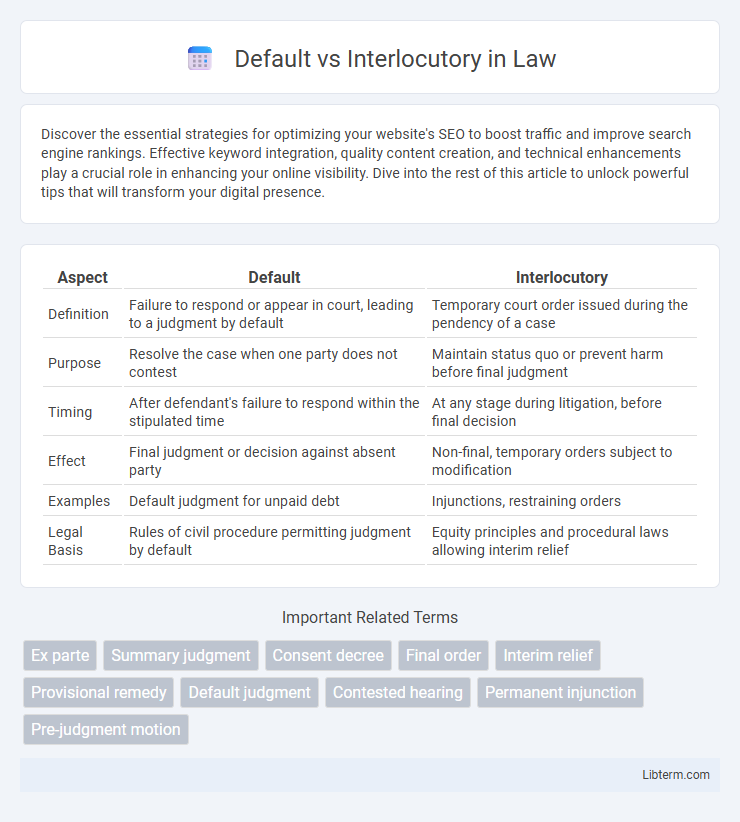Discover the essential strategies for optimizing your website's SEO to boost traffic and improve search engine rankings. Effective keyword integration, quality content creation, and technical enhancements play a crucial role in enhancing your online visibility. Dive into the rest of this article to unlock powerful tips that will transform your digital presence.
Table of Comparison
| Aspect | Default | Interlocutory |
|---|---|---|
| Definition | Failure to respond or appear in court, leading to a judgment by default | Temporary court order issued during the pendency of a case |
| Purpose | Resolve the case when one party does not contest | Maintain status quo or prevent harm before final judgment |
| Timing | After defendant's failure to respond within the stipulated time | At any stage during litigation, before final decision |
| Effect | Final judgment or decision against absent party | Non-final, temporary orders subject to modification |
| Examples | Default judgment for unpaid debt | Injunctions, restraining orders |
| Legal Basis | Rules of civil procedure permitting judgment by default | Equity principles and procedural laws allowing interim relief |
Understanding Default and Interlocutory: Key Legal Terms
Default refers to the failure of a party to respond or appear in a legal proceeding, often resulting in a judgment against them without trial. Interlocutory pertains to temporary or provisional court orders issued during the course of litigation, neither final nor conclusive. Understanding these terms is crucial for navigating procedural nuances in civil and criminal law cases, as defaults can lead to uncontested decisions while interlocutory orders manage ongoing disputes before final resolution.
Overview of Default Judgments
Default judgments occur when a defendant fails to respond to a legal complaint within the designated timeframe, resulting in the plaintiff winning the case by default. They provide a mechanism to expedite legal proceedings by resolving disputes without a trial when the opposing party does not contest the claims. Courts typically require the plaintiff to submit evidence supporting the claims before granting a default judgment, ensuring that the decision is not automatic but based on the merits presented.
Overview of Interlocutory Orders
Interlocutory orders are temporary rulings issued during the pendency of a case to address procedural or preliminary matters without determining the final outcome. They aim to ensure fair and efficient case management, often involving issues such as temporary injunctions, discovery disputes, or procedural motions. Unlike default judgments, interlocutory orders do not resolve the ultimate rights of the parties but facilitate the progression of litigation.
Main Differences: Default vs Interlocutory
Default judgments are issued when a party fails to respond or appear in court, resulting in an automatic decision against the absent party. Interlocutory orders, on the other hand, address procedural or preliminary issues during ongoing litigation and do not conclude the case. The main difference lies in finality: default judgments resolve the matter on the merits, whereas interlocutory orders manage case progress without determining the ultimate outcome.
Legal Procedures for Obtaining a Default Judgment
In legal procedures, obtaining a default judgment requires the plaintiff to demonstrate that the defendant failed to respond or appear within the stipulated time, establishing the defendant's default. Interlocutory judgments, by contrast, are provisional rulings made during the pendency of a case and do not dispose of the entire lawsuit. Courts grant default judgments following strict procedural rules, including proper service of process and notice, to ensure that the defendant's due process rights are preserved.
Legal Procedures for Issuing Interlocutory Orders
Interlocutory orders are temporary rulings issued during the course of litigation to address urgent matters without determining the final outcome, differing significantly from default judgments which arise from a party's failure to respond. Legal procedures for issuing interlocutory orders typically involve parties presenting evidence or arguments swiftly to the court to obtain relief that preserves rights or status quo pending trial resolution. Courts exercise discretion based on criteria such as urgency, irreparable harm, and balance of convenience, ensuring interlocutory orders are fair and just while maintaining procedural efficiency.
Effects and Consequences on Parties Involved
Default judgments result in an automatic win for the plaintiff due to the defendant's failure to respond, often leading to immediate enforcement actions such as wage garnishment or asset seizure. Interlocutory orders, being provisional rulings during litigation, affect party strategies by altering case posture without final resolution, potentially influencing settlement negotiations and trial readiness. The consequence of default is usually detrimental to the defendant's legal standing, whereas interlocutory decisions primarily shape the procedural course and tactical approaches for both parties.
Common Scenarios: When Each Applies
Default judgments typically occur when a defendant fails to respond to a lawsuit within the designated time frame, leading the court to grant the plaintiff's requested relief without a trial. Interlocutory orders apply during ongoing legal proceedings to address preliminary or procedural matters, such as injunctions, discovery disputes, or temporary restraining orders. Common scenarios for default judgments include uncontested debt collection cases, while interlocutory orders frequently arise in complex litigation requiring interim decisions before the final judgment.
Appeals and Challenges: Default and Interlocutory
Appeals in default judgments are typically limited and must meet strict procedural requirements, often requiring the appellant to prove excusable neglect or a meritorious defense. Interlocutory appeals challenge non-final orders, allowing parties to dispute critical issues before the final judgment, but are subject to courts granting permission due to their discretionary nature. Understanding the distinction between default and interlocutory appeals is essential to navigating procedural rules and maximizing the chances of successful challenges in civil litigation.
Best Practices for Handling Default and Interlocutory Situations
Handling default and interlocutory situations requires clear documentation and timely communication to prevent escalation and ensure procedural fairness. Employing standardized protocols, such as setting strict deadlines for responses and conducting prompt hearings, mitigates risks associated with default judgments and preserves parties' rights during interlocutory proceedings. Leveraging case management tools enhances tracking and compliance, promoting efficient resolution and minimizing delays in both default and interlocutory contexts.
Default Infographic

 libterm.com
libterm.com